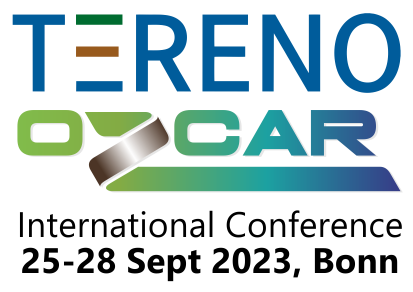Scientific Programme / Sessions, Keynote Speakers and Conveners
The scientific programme is scheduled from Tuesday, 26 September 2023 to Thursday, 28 September 2023.
Find topic details and the download for the detailed programme below.
Download detailed programmme as pdf.
Among the topics of the conference recent developments and research results in the following fields are addressed:
Keynote Speaker: Dr. Daniela Vanella
Department of Agriculture, Food and Environment, University of Catania, More Infomation
Conveners: Daniel Rasche (GFZ), Laurent Longuevergne (Géosciences, Rennes), Ulrike Werban (UFZ, Leipzig), Nolwenn Lesparre (ITES, Strasbourg)
Abstract: Access to informative observation is a pre-requisite to understand how linkages between geological, biological and hydrological cycles defines the critical zone. This thin and highly heterogeneous layer of the Earth extends from the land surface, including vegetation and water bodies, through the pedosphere and the unsaturated zone to the groundwater. The challenges consist in obtaining adequate representations of landscape spatial heterogeneity to inform bottom-up modeling approaches, or to design and perform integrated measurements to meaningfully constrain top-down modeling approaches. Several data sources are rarely used or poorly exploited in critical zone studies. These include new types of data that are still under investigation, as well as traditional types of data (e.g. results of fieldwork investigations, maps of various characteristics of the landscape) that are seldom used to a full degree in larger scale studies for various reasons, such as incommensurability problems and inadequate models.
This session will focus on how data obtained from new observation techniques and from innovative analysis of existing data sources can be used to inform model design and process identification at larger scales. We solicit contributions related but not limited to:
(i) Innovative sensing and experimental techniques to advance understanding of the critical zone (e.g. wireless distributed sensing, cosmic-ray neutron sensing, hydrogeophysical methods, fiber optics, tracing methods, etc.). We also encourage submissions of works focusing on new instrumental techniques and developments with strong potential to widen points of views (microbiology, citizen science, …) and update approaches (energetic and teletransmission challenges, …)
(ii) Methods for the evaluation, visualization, and interpretation of monitoring and experimental data sets from multiple sources to maximize the information gained from critical zone observatories. Thus, we encourage submissions of works dealing with model-data fusion including new concepts for joint and coupled inversion.
(iii) Analysis of spatial and temporal patterns of critical zone properties and processes at different scales (e.g. source deconvolution for hot moments/hot spots identification)
(iv) Unusual and unexpected critical zone phenomena identified by measurements that seem to defy current understanding of the critical zone. Such phenomena could have been observed in the field or in the laboratory. Contributions focussing on the understanding of linked hydrological, geophysical properties and or geochemical processes are highly welcome.
Social Programme
Excursion „TERENO test site Wüstebach“ and "Rurtalsperre Schwammenauel"
On Monday, 25 September 2023, the conference participants have the opportunity to join a half day excursion.The field excursion will visit the TERENO test site Wüstebach, which is a key experimental research site of the Lower Rhine Valley-Eifel terrestrial observatory of TERENO. The Wüstebach test site is also part of the Integrated Carbon Observation Network (ICOS) and belongs to LTER-D network.
The impressive Rurtalsperre Schwammenauel with a capacity of 205 million cbm is one of the largest dams in Germany. The 480 meter long dam wall consists of a layer of earth and rock with a clay seal and a concrete base.
Special Event and Apero "Franco-German research and scientific cooperations"
The kick-off for the conference reception will be an special event on Monday, 25 Setember, 6 pm-7 pm.
Siegfried Martin-Diaz will moderate the exchange on Franco-German scientific and research cooperations: history, timeliness, funding opportunities.
All conference attendees are cordially invited to join this event at the conference venue.
Conference Reception
An Ice Breaker Party is being arranged for all conference participants on Monday, 25 September 2023, 6:00 pm at the conference venue. All conference attendees are cordially invited to this reception.
Conference Dinner
The Conference Dinner will be held on Wednesday, 27 September 2023 on the river boat “Moby Dick” – a pleasant and relaxing way to have dinner and enjoy the river Rhine.













